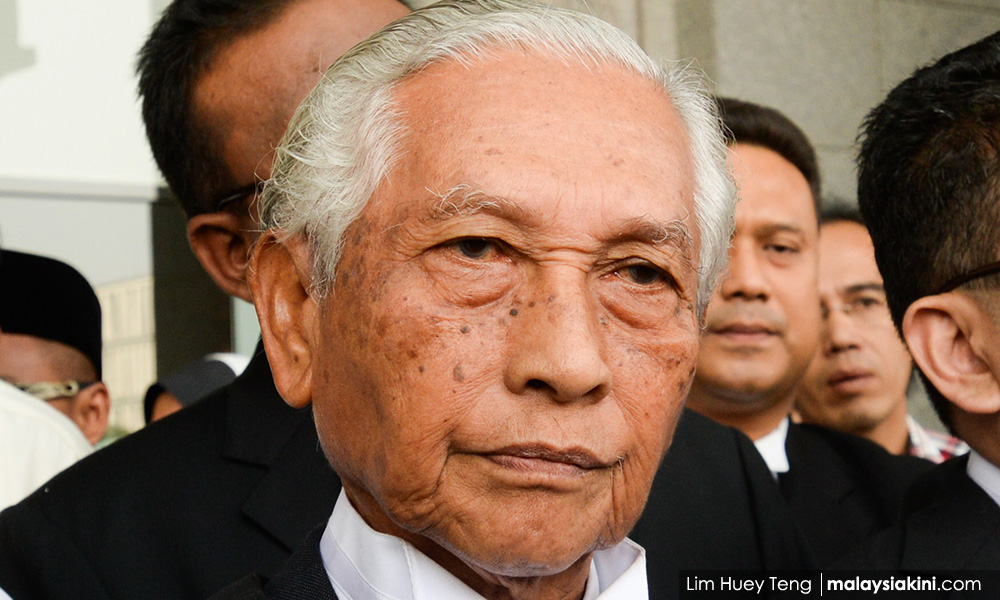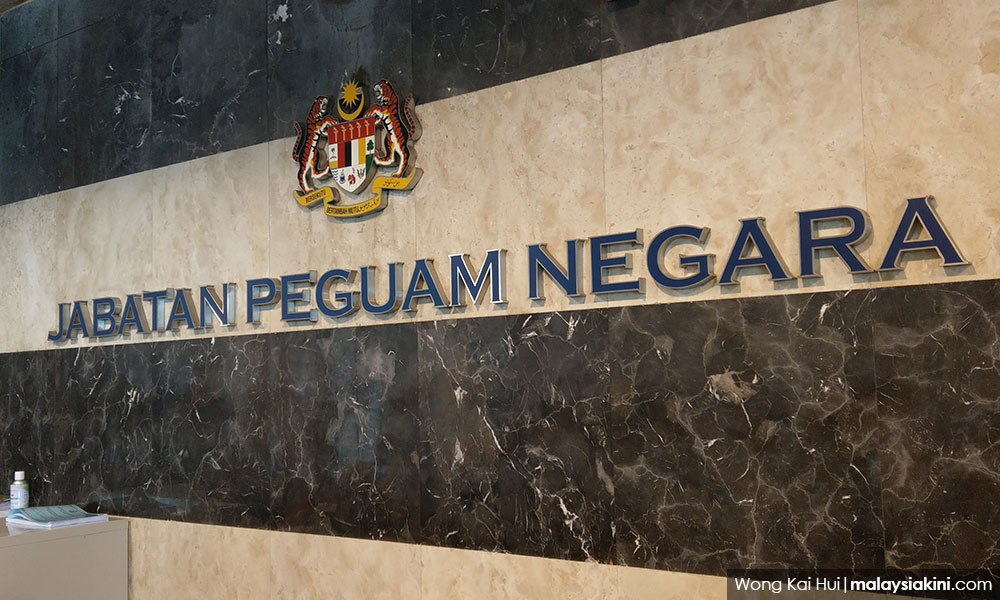
It is seditious to move for the abolition of the Sedition Act 1948, claimed a lawyer who was involved in drafting amendments to the law in wake of the May 13, 1969 racial riots.
This is unless, according to Abdul Aziz Abdul Rahman, the Conference of Rulers has already consented to it beforehand.
Abolishing the Sedition Act would also need the consent of two-thirds of the Parliament, unlike most laws where a simple majority would suffice.
“I would like to say here that the Sedition Act refers to anyone who is being seditious. To abolish it is seditious – any person who wants it abolished can be arrested and charged […]
“The Sedition Act was enacted under Article 10(4) of the Federal Constitution. Because of that, it cannot be abolished or amended without the consent of the Conference of Rulers as well as two-thirds of Parliament.
“They cannot act (because of) Section 4(1) of the Sedition Act. They can’t change it. They’d have to get the consent of the Conference of Rulers.
“The government may counter, ‘How can we be government but can’t amend laws?’ They can. Follow the constitution; have an audience with the Conference of Rulers. If they don’t do any of that, then they can’t. It is wrong,” he told reporters today at a press conference at his house in Kuala Lumpur.
The lawyer explained that Article 159(3) of the Federal Constitution stipulates, among others, that any law enacted under Article 10 (4) of the Federal Constitution cannot be passed in either house of Parliament unless it is supported by at least two-thirds of its members.
This makes the Sedition Act an extraordinary piece of legislation as most bills, except amendments to the Federal Constitution, can be passed with only a simple majority.
In addition, Abdul Aziz said Article 159(5) of the Federal Constitution stipulates that laws enacted under Article 10(4) cannot be passed without the consent of the Conference of Rulers.
To back his claim that even moving to abolish the Sedition Act is an offence, he cited Section 4(1) of the Sedition Act, which outlaws any person who “does or attempts to do, or makes any preparation to do, or conspires with any person to do, any act which has or which would, if done, have a seditious tendency”.
He also pointed out Section 3(1)(f) defines that to question any matter established by Part III, Article 152, Article 153, and Article 181 of the Federal Constitution, constitutes a seditious tendency.
Respectively, these constitutional provisions deal with matters that pertain to citizenship, the national language, the special position of Malays and natives of Sabah and Sarawak, and sovereignty of the Malay rulers.
Most important law in the country
When asked what if it is the attorney-general who is moving to abolish the Sedition Act and whether he is immune from prosecution on this matter, Abdul Aziz said he is not, but no one could take action against the attorney-general.
He suggested that the people could hold a mass rally outside the Attorney-General’s Chambers instead and pressure the attorney-general to read the relevant legislation.

Abdul Aziz added that the Sedition Act and the Federal Constitution had been amended in 1970, which includes inserting the provision that he mentioned.
At the time, he said he was a legal officer at the National Operations Council (Mageran), which was running the country under emergency rule following the 1969 racial riots.
Abdul Aziz said the emergency government under Abdul Razak Hussein at the time determined that the riots were racial in nature and identified four sensitive issues that could not be questioned, lest there would be a recurrence of the riot.
These are matters that pertain to the national language, the special position of Malays and natives of Sabah and Sarawak, citizenship particularly of non-Malays, and the sovereignty of the Malay rulers.
Originally, he said Mageran wanted to enact a special law to protect these four issues, but later decided that it would suffice to amend the colonial-era Sedition Act to suit the purpose.
He said the Sedition Act is the most important law in the country, as it has successfully prevented a recurrence of racial riots.
Abdul Aziz also told reporters that as recent as 2014, the Conference of Rulers did not want the Sedition Act to be amended.
At the time, the then prime minister Najib Abdul Razak had pledged to repeal to Sedition two years earlier, and the Conference of Rulers had summoned Abdul Aziz along with former inspector-general of police Hanif Omar to give their views on the Sedition Act.
Abdul Aziz said he didn’t realise Najib was in the meeting until the former premier interrupted him by raising his hand and saying that the government would not abolish the Sedition Act and had never decided that it would abolish the law.
“But then he (Najib) had made statements in Parliament and all that. We’ve read it in newspapers. But, the Johor Sultan (Ibrahim Ismail, who was chairing the meeting) didn’t ask about it, he said, ‘Okay, okay, okay. You keep the law, don’t touch it.
“Najib would not admit he wants to abolish (the Sedition Act) before the Conference of Rulers,” he said.
In the 2014 Umno general assembly, Najib had reneged on his promise and announced that he would not only retain the Sedition Act, but would also introduce amendments to strengthen it.
Those amendments were passed by Parliament and granted royal assent, but no date has been set for it to come into effect.
It is unclear if the Conference of Rulers meeting Abdul Aziz mentioned took place before or after the Umno assembly.
Dancing CJ, AG a non-issue
On another matter, the lawyer said it is a non-issue for the chief justice, de facto law minister, attorney-general, and lawyers to be seen dancing together.
Abdul Aziz said he had danced along at such events as well when he was a magistrate and deputy public prosecutor.
“It is a way of paying respects to our fraternity. That’s all. After that we all go back to our respective homes, nothing happens, and we all forget about it,” he said.

He was asked about a video of the gala dinner on Friday that followed the opening of the 2019 legal year, in which Chief Justice Richard Malanjum, attorney-general Tommy Thomas, and many prominent lawyers were seen dancing together on stage.
Abdul Aziz, who is a former Malaysian Airlines managing director, was also asked to comment on an article in the airline’s inflight magazine that promoted a pork-based dish.
He replied saying that as a national flag carrier, MAS should respect Malaysian law including the provision that Islam is the religion of the federation.
“So, if we say that Islam is the religion of the federation in our country, we can’t (do that). We’d just keep quiet.
“You can have pork in (the country), but just keep quiet and don’t promote it (heboh-hebohkan). As a national carrier, they’d have to safeguard national dignity.
Earlier today, Utusan Malaysia quoted Perkasa vice-chief Amini Amir Abdullah expression outrage towards the “Restaurant Openings” section in the Going Places magazine’s January edition, accusing MAS of being insensitive towards Muslims.
“Publishing a picture of pork steak in the advertisement is very distressing to Muslims. Is there no other food that can be advertised?” he was quoted as saying.
In a separate Utusan Malaysia article today, MAS was quoted apologising over the matter.
“As with any other lifestyle magazine, the restaurant review is meant to promote restaurants to passengers from all over the world. Malaysia is a country of many races and the review is not intended to offend any passenger,” it reportedly said.
The airline also clarified that a photo accompanying the article depicts a cut of wagyu beef and squid, not pork steak as Perkasa alleged. - Mkini



No comments:
Post a Comment
Note: Only a member of this blog may post a comment.